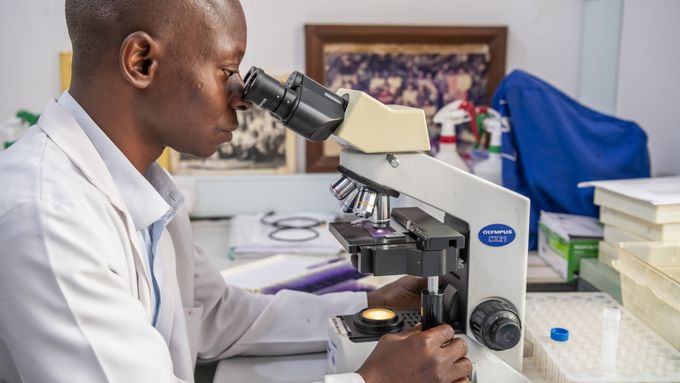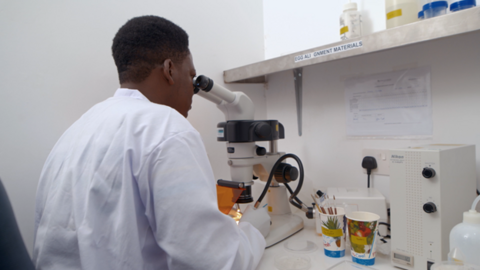Milestone in the Fight Against Sleeping Sickness
15.12.2023
The European Medicines Agency has adopted a positive opinion of fexinidazole for the treatment of T.b. rhodesiense sleeping sickness, found in Eastern and Southern Africa. The positive opinion is followed a clinical trial conducted by the HAT-r-ACC Consortium, of which Swiss TPH is a part. This is an important milestone in the fight against this acute and lethal form of the neglected tropical disease.

The positive opinion by EMA is a major milestone after 30 years of research into better treatments for sleeping sickness. (Photo: Olivier Brandenberg/Swiss TPH)
Sanofi, DNDi and the HAT-r-ACC consortium announce the European Medicines Agency’s (EMA) Committee for Medicinal Products for Human Use (CHMP) has adopted a positive scientific opinion of Fexinidazole Winthrop as first oral treatment of acute form of sleeping sickness. This positive opinion is for the treatment of Trypanosoma brucei (T.b.) rhodesiense sleeping sickness, an acute and lethal form of this parasitic disease found in Eastern and Southern Africa.
This CHMP opinion follows an application by Sanofi under Article 58 and clinical trials in Malawi and Uganda led by the non-profit medical research organization Drugs for Neglected Diseases initiative (DNDi). In 2018, the CHMP first adopted a positive opinion of Fexinidazole Winthrop as the first all-oral treatment of the more common T.b. gambiense form of sleeping sickness found in West and Central Africa.
A fatal disease transmitted by the tsetse fly
Sleeping sickness, or human African trypanosomiasis (HAT), is usually fatal without treatment. Both forms of sleeping sickness – T.b. rhodesiense and T.b. gambiense – are transmitted by the bite of infected tsetse flies, which are found in 36 African countries. It causes neuropsychiatric symptoms, including aggressiveness, psychosis, a debilitating disruption of sleep patterns that have given this neglected disease its name, and ultimately, death.
Clinical Trial conducted by the HAT-r-ACC consortium
The CHMP opinion paves the way for the update of WHO guidelines on treatment for sleeping sickness, and distribution by WHO of Fexinidazole Winthrop in African countries where T.b. rhodesiense is prevalent. Fexinidazole Winthrop will be donated to WHO by Foundation S, Sanofi’s philanthropic organization. The clinical trial for T.b. rhodesiense was conducted by the HAT-r-ACC Consortium, with funding from the European and Developing Countries Clinical Trials Partnership Association (EDCTP2) programme supported by the European Union and others.
The HAT-r-ACC consortium brings together a broad range of partners with expertise in sleeping sickness and capacity building in remote health settings. This research, training, and community engagement experience is essential to run the clinical trial in remote settings with a very small target population. The consortium partners include the Malawi Ministry of Health (MMoH), the Uganda National Health Research Organisation (UNHRO), the Makerere University in Uganda, Epicentre (MSF) in France, the Lisbon Institute of Hygiene and Tropical medicine (IHMT) in Portugal, the Institut de Recherche pour le Développement (IRD) in France, the WHO, and Swiss TPH.
Contribution of Swiss TPH
Swiss TPH was involved in the discovery, preclinical development and clinical trials of fexinidazole. From more than 800 molecules, fexinidazole was singled out as the most promising. “This is a great success after 30 years of research into better treatments for this dreadful disease”, said Christian Burri, Head of the Medicines Implementation Research unit at Swiss TPH. “One of Swiss TPH’s major contributions in these efforts has been to provide a proof of concept for conducting clinical trials in extremely remote areas and with very small study populations. This know-how can now also be applied to other neglected diseases.”
Stay connected to global health
Subscribe to the Swiss TPH newsletter for updates on research, projects, education, jobs and events.


